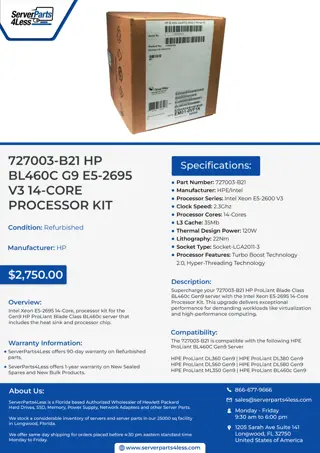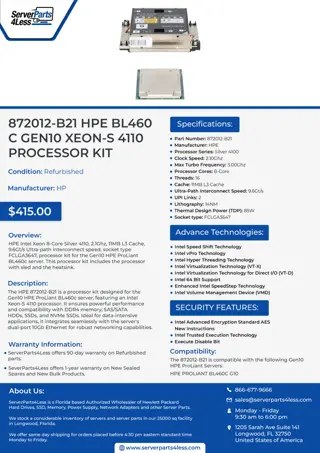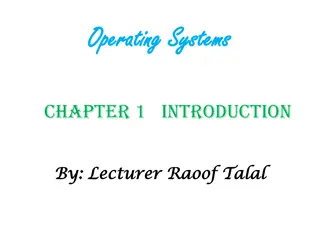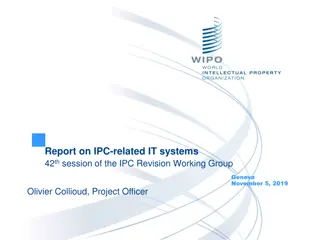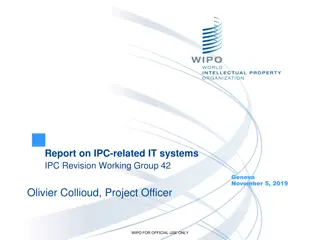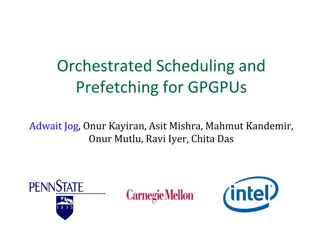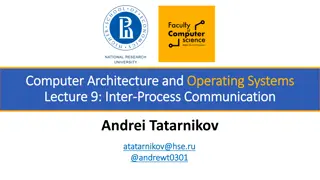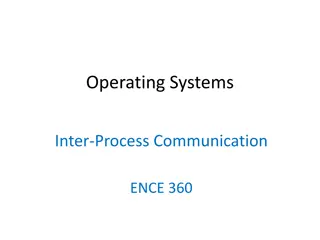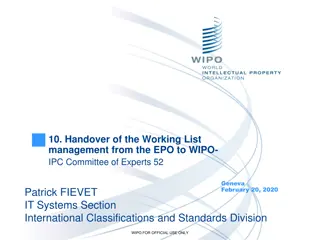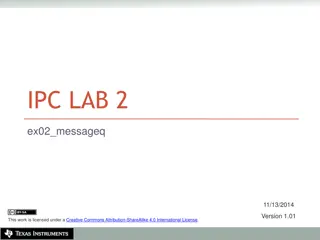Overview of Inter-Processor Communication (IPC) in Processor Communication Link
Overview of Inter-Processor Communication (IPC) entails communication between processors, synchronization methods, and supported device types. The IPC architecture supports diverse use cases with various thread combinations and messaging types, catering to multi- or uni-processor environments. The API consistency across devices and operating systems enhances flexibility and ease of development.
Download Presentation

Please find below an Image/Link to download the presentation.
The content on the website is provided AS IS for your information and personal use only. It may not be sold, licensed, or shared on other websites without obtaining consent from the author.If you encounter any issues during the download, it is possible that the publisher has removed the file from their server.
You are allowed to download the files provided on this website for personal or commercial use, subject to the condition that they are used lawfully. All files are the property of their respective owners.
The content on the website is provided AS IS for your information and personal use only. It may not be sold, licensed, or shared on other websites without obtaining consent from the author.
E N D
Presentation Transcript
IPC TRAINING Processor Communication Link 11/13/2014 Version 2.21 Creative Commons Attribution-ShareAlike 4.0 International License Creative Commons Attribution-ShareAlike 4.0 International License This work is licensed under a Creative Commons Attribution-ShareAlike 4.0 International License. IPC 3.30
Agenda Overview IPC Modules Configuration Scalability Optimization Footnotes 2 IPC 3.30
Overview Inter-Processor Communication (IPC) Communication between processors Synchronization between processors Two modes Peer-to-peer All cores running TI-RTOS Master-slave Master core running HLOS (e.g. Linux, QNX, Android) Slave cores running TI-RTOS 3 IPC 3.30
Overview Rich device support Homogeneous devices C6472, C6678, ... Heterogeneous devices OMAP5, DRA7XX, TCI6638K2X, OMAP-L138, F28M35, ... 4 IPC 3.30
Overview Flexible design supports many use cases Many thread combinations (Task, Swi, Hwi) Two types of messaging: notification, message queuing Multi- or uni-processor environments Hardware abstraction Device-specific support for hardware spinlocks, inter-processor mailbox IPC APIs are same across devices (e.g. GateMP implemented with hardware spinlock or software Peterson algorithm as needed) OS-agnostic Same APIs on all operating systems 5 IPC 3.30
Overview - Architecture Application IPC SYS/BIOS Hardware 6 IPC 3.30
Overview Top-level modules, used by application ti.sdo.ipc ti.sdo.utils Notify Ipc MultiProc MessageQ SharedRegion NameServer HeapMemMP HeapBufMP GateMP 7 IPC 3.30
Overview create/open Create/open model used to share instances of IPC modules Shared objects are created by the owner and opened by the user(s) Some objects may be opened multiple times (e.g. MessageQ, GateMP). Objects must have system-wide unique names Delete/close methods are used to finalize objects Owner should not delete until all users have closed 8 IPC 3.30
Overview Cache Management Cache coherency operations are performed by the module when shared state is accessed/modified Shared data is padded to prevent sharing cache line with other data Data Protection Shared data is protected by a multi-processor gate when accessed/modified 9 IPC 3.30
Agenda Overview IPC MODULES Lab 1 ex01_hello Configuration Scalability Optimization Footnotes 10 IPC 3.30
IPC Modules Ipc IPC Manager MessageQ send and receive messages NameServer distributed name/value database Notify send and receive event notifications MultiProc processor identification SharedRegion shared memory address translation GateMP protect a critical section HeapMemMP, HeapBufMP multi-processor memory allocator 11 IPC 3.30
Ipc Module Ipc IPC Manager Used to initialize IPC and synchronize with other processors. Application must call Ipc_start and Ipc_attach. Two startup protocols Ipc.ProcSync_ALL - all processors start at same time Ipc.ProcSync_PAIR host processor starts first Configuration Ipc.procSync configures startup protocol When using Ipc.ProcSync_ALL, Ipc_attach is called internally from Ipc_start. Application does not call Ipc_attach. 12 IPC 3.30
Ipc Module Ipc.ProcSync_ALL app.cfg var Ipc = xdc.useModule('ti.sdo.ipc.Ipc'); Ipc.procSync = Ipc.ProcSync_ALL; var MultiProc = xdc.useModule('ti.sdo.utils.MultiProc'); MultiProc.setConfig(proc, ["HOST", "IPU1", "DSP1"]); SR_0 Reserved Header host is owner of SR_0 Flags HOST Ipc_start() Log_print("IPC ready") handshake completes Heap IPU1 Ipc_start() Log_print("IPC ready") DSP1 Ipc_start() Log_print("IPC ready") 13 IPC 3.30
IPC Module Ipc.ProcSync_PAIR var Ipc = xdc.useModule('ti.sdo.ipc.Ipc'); Ipc.procSync = Ipc.ProcSync_PAIR; handshake completes SR_0 HOST host is owner of SR_0 Reserved Header Ipc_start() do { status = Ipc_attach(IPU1) } while (status == Ipc_E_NOTREADY) Log_print("IPC to IPU1 ready") do { status = Ipc_attach(DSP1) } while (status == Ipc_E_NOTREADY) Log_print("IPC to DSP1 ready") Flags Heap IPU1 Ipc_start() do { status = Ipc_attach(HOST) } while (status == Ipc_E_NOTREADY) Log_print("IPC to HOST ready") DSP1 Ipc_start() do { status = Ipc_attach(HOST) } while (status == Ipc_E_NOTREADY) Log_print("IPC to HOST ready") 14 IPC 3.30
Ipc Module Topology Topology expresses which processors communicate with IPC Transport created between two processors when they attach In previous example, HOST attached to IPU1 and DSP1. If IPU1 and DSP1 need to communicate with IPC, they must also attach to each other. Using Ipc.ProcSync_ALL creates transports between all processors. HOST transport DSP1 IPU1 IPU1 and DSP1 must attach to create their own transport 15 IPC 3.30
Ipc Module Why have two modes? Because some applications are static and some are dynamic. Static System In a static system all processors are started at the same time. Once the processor is loaded, same application runs forever. IPC startup is part of device boot phase. This is typical for homogeneous devices. Base station, telecommunication, single purpose application. Dynamic System In a dynamic system, host processor boots first. Slave processors are booted later depending on application. Slave is shut down when application terminates. Slave reloaded many times, possibly with different executable. Consumer electronics, cell phone. 16 IPC 3.30
Ipc Module - API API Summary Ipc_start reserve memory, create default gate and heap Ipc_stop release all resources Ipc_attach setup transport between two processors Ipc_detach finalize transport 17 IPC 3.30
Ipc Module - ROV ROV screen shot 18 IPC 3.30
MessageQ MessageQ send and receive messages A message queue receives messages Single reader, multiple writers on same message queue Message queue instance created by reader, opened by writers IPU1 DSP1 reader writer cmdQ:MessageQ IPU2 msg msg writer msg msg writer 19 IPC 3.30
MessageQ transport Transport-independent API, works with local memory, shared memory, copy based transport (SRIO) Default transport offers zero-copy transfers via shared memory IPU1 IPU2 Application Application MessageQ MessageQ Transport Transport 20 IPC 3.30
MessageQ Message structure Every message contains an embedded message queue header followed by the payload. Application is responsible for the header allocation. Message size must include header and payload sizes. Actual message size is typically padded typedef struct { Bits32 reserved0; /* reserved for List.elem->next */ Bits32 reserved1; /* reserved for List.elem->prev */ Bits32 msgSize; /* message size */ Bits16 flags; /* bitmask of different flags */ Bits16 msgId; /* message id */ Bits16 dstId; /* destination queue id */ Bits16 dstProc; /* destination processor id */ Bits16 replyId; /* reply id */ Bits16 replyProc; /* reply processor */ Bits16 srcProc; /* source processor */ Bits16 heapId; /* heap id */ Bits16 seqNum; /* sequence number */ Bits16 reserved; /* reserved } MessageQ_MsgHeader MessageQ_MsgHeader Payload message size */ typedef struct { MessageQ_MsgHeader reserved; char payload[50]; } App_Msg; 21 IPC 3.30
MessageQ Message types MessageQ_MsgHeader is structure type definition. typedef struct { ... } MessageQ_MsgHeader; MessageQ_Msg is pointer to structure type definition. typedef MessageQ_MsgHeader *MessageQ_Msg; Message Allocation Message allocation must be large enough to hold the embedded message queue header and your payload. See Message structure. 22 IPC 3.30
MessageQ reader/writer IPU DSP Send a message from IPU to DSP (one-way message) Both processors register a heap with MessageQ module Receiving processor creates a message queue (DSP) Sending processor opens the message queue (IPU) Sending processor will... allocate a message write the payload send message Receiving processor will... get message read the payload free the message 23 IPC 3.30
MessageQ reader/writer IPU DSP IPU DSP SharedRegion #0 Reserved Header MessageQ MessageQ HeapId IHeap Handle HeapId IHeap Handle sr0: HeapMemMP 2 sr0: HeapMemMP 2 sr0: HeapMemMP Writer Reader DSP.workq: MessageQ MessageQ_alloc MessageQ_get msg msg msg MessageQ_put MessageQ_free 24 IPC 3.30
MessageQ reader/writer IPU (writer) #include <xdc/std.h> #include <ti/ipc/MessageQ.h> #include <ti/ipc/SharedRegion.h> #define HEAP_ID 2 #define MSG_SZ sizeof(MessageQ_MsgHeader) + 50 Ptr heap; MessageQ_Msg msg; MessageQ_QueueId qid; heap = SharedRegion_getHeap(0); MessageQ_registerHeap(HEAP_ID, heap); do { } while (status == MessageQ_E_NOTFOUND); status = MessageQ_open("DSP1.workq", &qid); Task_sleep(1); while (running) { msg = MessageQ_alloc(HEAP_ID, SIZE) /* write payload */ MessageQ_put(qid, msg) } 25 IPC 3.30
MessageQ reader/writer DSP (reader) #include <xdc/std.h> #include <ti/ipc/MessageQ.h> #include <ti/ipc/SharedRegion.h> #define HEAP_ID 2 Ptr heap; MessageQ_Handle que; MessageQ_Msg msg; heap = SharedRegion_getHeap(0); MessageQ_registerHeap(HEAP_ID, heap); que = MessageQ_create("DSP1.workq", NULL); while (running) { MessageQ_get(que, &msg, MessageQ_FOREVER); /* read payload */ MessageQ_free(msg); } 26 IPC 3.30
MessageQ client/server IPU DSP IPU Send a message from IPU to DSP and back again (round trip message) Both processors create a message queue IPU processor will... allocate a message write the payload send message wait for return message read payload free the message DSP processor will... wait for message read the payload write new payload send message 27 IPC 3.30
MessageQ client/server IPU DSP IPU IPU SharedRegion #0 DSP Reserved Header MessageQ MessageQ sr0: HeapMemMP Client Memory_alloc Server msg MessageQ_staticMsgInit MessageQ_setReplyQueue MessageQ_get DSP.workq: MessageQ msg msg MessageQ_put msg n: MessageQ MessageQ_getReplyQueue MessageQ_put MessageQ_get msg msg Memory_free 28 IPC 3.30
MessageQ client/server IPU (client) #include <xdc/std.h> #include <xdc/runtime/IHeap.h> #include <xdc/runtime/Memory.h> #include <ti/ipc/MessageQ.h> #include <ti/ipc/SharedRegion.h> #define MSG_SZ sizeof(MessageQ_MsgHeader) + 50 IHeap_Handle heap; MessageQ_Handle ipuQ; MessageQ_Msg msg; MessageQ_QueueId dspQ; heap = (IHeap_Handle)SharedRegion_getHeap(0); ipuQ = MessageQ_create(NULL, NULL); do { } while (status == MessageQ_E_NOTFOUND); status = MessageQ_open("DSP.workq", &dspQ); msg = Memory_alloc(heap, SIZE, 0, NULL); MessageQ_staticMsgInit(msg, SIZE); MessageQ_setReplyQueue(ipuQ, msg); /* write payload */ MessageQ_put(dspQ, msg); MessageQ_get(ipuQ, &msg, MessageQ_FOREVER); /* read payload */ Memory_free(heap, msg, SIZE); 29 IPC 3.30
MessageQ client/server DSP (server) #include <xdc/std.h> #include <ti/ipc/MessageQ.h> #include <ti/ipc/SharedRegion.h> MessageQ_Handle dspQ; MessageQ_QueueId qid; MessageQ_Msg msg; dspQ = MessageQ_create("DSP.workq", NULL); while (running) { MessageQ_get(dspQ, &msg, MessageQ_FOREVER); /* process payload */ qid = MessageQ_getReplyQueue(msg); MessageQ_put(qid, msg); } 30 IPC 3.30
MessageQ MessageQ works with any SYS/BIOS threading model: Hwi: hardware interrrupts Swi: software interrupts Task: threads that can block and yield Variable size messages Timeouts are allowed when a Task receives messages Message Ownership Rules Acquire ownership with MessageQ_alloc, MessageQ_get Loose ownership with MessageQ_free, MessageQ_put Do not dereference a message when you don t have ownership 31 IPC 3.30
MessageQ Uses an IHeap heap implementation to support MessageQ_alloc and MessageQ_free. Heaps are coordinated across processors by a common index which is registered using MessageQ_registerHeap API Heap ID is stored in message header 32 IPC 3.30
MessageQ - API API Summary MessageQ_create create a new message queue MessageQ_open open an existing message queue MessageQ_alloc allocate a message from the pool MessageQ_free return message to the pool MessageQ_put send a message MessageQ_get receive a message MessageQ_registerHeap register a heap with MessageQ 33 IPC 3.30
MessageQ - ROV ROV screen shot 34 IPC 3.30
Lab ex01_hello Please open the PowerPoint slide named IPC_Lab_1_Hello 35 IPC 3.30
NameServer Module NameServer distributed name/value database Manages name/value pairs Used for registering data which can be looked up by other processors API Summary NameServer_create create a new database instance NameServer_add add a name/value entry into database NameServer_get retrieve value for given name 36 IPC 3.30
NameServer IPU create NameServer instance DSP query IPU for name/value pair DSP IPU Application Application NameServer_create NameServer_create NameServer_add NameServer_get email: NameServer email: NameServer JohnDoe johndoe@mm.com 37 IPC 3.30
NameServer IPU create NameServer instance DSP query IPU for name/value pair IPU DSP #include <string.h> #include <xdc/std.h> #include <ti/ipc/NameServer.h> #include <xdc/std.h> #include <ti/ipc/NameServer.h> NameServer_Handle ns; Char buf[32]; Int len; NameServer_Handle ns; Char buf[]; Int len; ns = NameServer_create("email", NULL); ns = NameServer_create("email", NULL); NameServer_get(ns, JohnDoe", buf, &len, NULL); strcpy(buf, johndoe@mm.com"); Int len = strlen(buf); NameServer_add(ns, JohnDoe", buf, len); 38 IPC 3.30
NameServer Module ROV screen shot 39 IPC 3.30
Notify Module Notify send and receive event notifications Inter-processor notifications Multiplex 32 events using single interrupt line Some events are used by IPC Notification is point-to-point Callback functions Register for a specific procId + lineId + eventId triplet Callback can be reused (use procId and lineId to de-multiplex) Callbacks can be chained (all callbacks are invoked) Callback function receives procId, eventId, arg, payload API Summary Notify_sendEvent raise an event Notify_registerEvent register a callback for an event Notify_registerEventSingle register for exclusive use of event Notify_FnNotifyCbck callback function type definition 40 IPC 3.30
Notify IPU DSP IPU sends a notification to the DSP IPU processor will... Send a NOP event to test the connection (optional) Send periodic event to the DSP DSP processor will... Create a semaphore to synchronize between callback and task Register for event notification Notify callback will post the semaphore Task will run 41 IPC 3.30
Notify IPU DSP DSP IPU n: Task Application n: Semaphore Notify_sendEvent Semaphore_post notifyCB Application IPC IPC ipc: Hwi raise interrupt Mailbox CPU 42 IPC 3.30
Notify IPU #include <xdc/std.h> #include <ti/ipc/MultiProc.h> #include <ti/ipc/Notify.h> #define EVT 12 #define NOP 0 UInt16 dsp = MultiProc_getId("DSP"); UInt32 payload; do { s = Notify_sendEvent(dsp, 0, EVT, NOP, TRUE); if (s == Notify_E_EVTNOTREGISTERED) { Task_sleep(1); } } while (s == Notify_E_EVTNOTREGISTERED); do { payload = ...; Notify_sendEvent(dsp, 0, EVT, payload, TRUE); } until(done); /* work */ 43 IPC 3.30
Notify DSP #include <xdc/std.h> #include <ti/sysbios/knl/Semaphore.h. #include <ti/ipc/MultiProc.h> #include <ti/ipc/Notify.h> #define EVT 12 #define NOP 0 UInt16 IPU = MultiProc_getId("IPU"); Semaphore_Handle sem; sem = Semaphore_create(0, NULL, NULL); Notify_registerEvent(IPU, 0, EVT, notifyCB, (UArg)sem); do { Semaphore_pend(sem, BIOS_WAIT_FOREVER); /* work */ } until(done); Void notifyCB(UInt16 procId, UInt16 lineId, UInt32 eventId, UArg arg, UInt32 payload) { Semaphore_Handle sem = (Semaphore_Handle)arg; if (payload != NOP) { Semaphore_post(sem); } } 44 IPC 3.30
Notify Module ROV screen shot 45 IPC 3.30
MultiProc Module MultiProc processor identification Stores processor ID of all processors in the multi-core application Stores processor name Processor ID is a number from 0 (n-1) Processor name is defined by IPC IPC Release Notes > Package Reference Guide > ti.sdo.utils.MultiProc > Configuration Settings > MultiProc.setConfig Click on Table of Valid Names for Each Device API Summary MultiProc_getSelf return your own processor ID MultiProc_getId return processor ID for given name MultiProc_getName return processor name 46 IPC 3.30
SharedRegion Module SharedRegion shared memory address translation Manages shared memory and its cache configuration Manages shared memory using a memory allocator SRPtr is a portable pointer type Multiple shared regions are supported Each shared region has optional HeapMemMP instance Memory is allocated and freed using this HeapMemMP instance HeapMemMP_create/open and managed internally at IPC initialization SharedRegion_getHeap API to get this heap handle 47 IPC 3.30
SharedRegion Module SharedRegion #0 is special Always contains a heap Contains global state that all cores need to access (reserved header) Must be placed in memory that is accessible by all BIOS cores in the system API Summary SharedRegion_getHeap return the heap handle SharedRegion_getId return region ID for given address SharedRegion_getPtr translate SRPtr into local address SharedRegion_getSRPtr translate local address into SRPtr 48 IPC 3.30
SharedRegion Module ROV screen shot 49 IPC 3.30
SharedRegion Sometimes, shared memory has different address on different processors. Use SharedRegion to translate addresses. 2: SharedRegion 0xA0000000 0x80000000 IPU DSP 50 IPC 3.30



